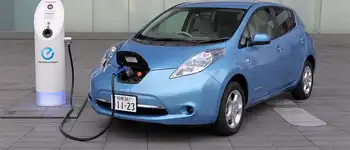Toyota to add solar panels to some Prius hybrids
By Reuters
CSA Z463 Electrical Maintenance -
Our customized live online or in‑person group training can be delivered to your staff at your location.

- Live Online
- 6 hours Instructor-led
- Group Training Available
The panels, supplied by Kyocera Corp would be able to power part of the air-conditioning on high-end versions of the gasoline-electric Prius, the source said.
"It's more of a symbolic gesture," said the source, who asked not to be identified. "It's very difficult to power much more than that with solar energy."
Toyota is due to launch the third-generation Prius next year.
Big automakers are racing to come up with alternative solutions to using fossil fuels to appear ecologically conscious and to lure consumers looking to save money at the pump.
But solar power is not seen as a viable solution to power cars. Solar panels are expensive due to rising silicon prices and storing energy is difficult, the source said. It was unknown how much the solar panels on the new Prius cars would cost, or how many solar-mounted versions Toyota would build.
A Toyota spokesman declined to comment, saying the company does not talk about future product plans.
Mazda Motor Corp briefly offered a solar panel option on two car models, the Eunos 800 and Sentia, in the early 1990s to ventilate the sedans while parked on hot summer days. The expensive option was unpopular and discontinued after a few years.
Kentaro Endo, a director at Japan's Ministry of Economy, Trade and Industry who specializes in renewable energy, said the application of solar energy was severely limited in vehicles.
"Even if you laid solar panels out on the entire roof of a house, you only generate enough energy to run two hair dryers," he said.
"It's an interesting idea, but it would be very difficult to power a whole car, even with technological advances."
Toyota has struggled to keep up with demand for the Prius as soaring gasoline prices put consumers off of gas-guzzling sport utility vehicles and pickup trucks. Rival Honda Motor Co will also step up its hybrid push with a new, low-cost model early next year, followed by several other gasoline-electric cars.
Automakers have teamed up with battery makers to develop and produce lithium-ion batteries to store more energy in smaller packages to extend cruising distances.
Toyota has partnered with Matsushita Electric Industrial Co while Nissan Motor Co has a joint venture with the NEC Corp group. Mitsubishi Motors Corp is working with GS Yuasa Corp.
The Prius, the world's first mass-produced gasoline-electric hybrid car, first went on sale in Japan in late 1997 and in other markets in 2000. Cumulative sales have topped 1 million units worldwide.
Toyota has a goal of selling at least 1 million hybrid cars a year in the early part of the next decade by offering the fuel-saving system on more vehicles.











